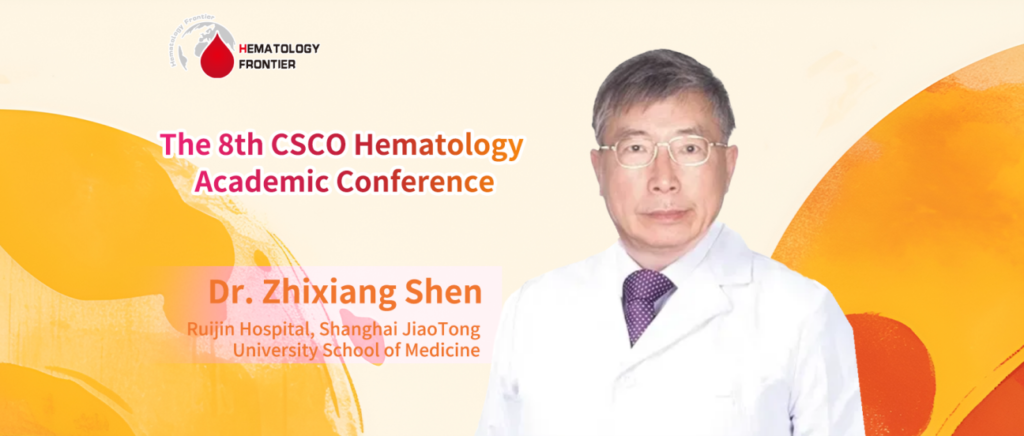
Editor's Note: In the scorching summer, experts gathered in the cool city of Harbin for the 8th Hematology Academic Conference, organized by the Chinese Society of Clinical Oncology (CSCO), CSCO Leukemia Expert Committee, and CSCO Lymphoma Expert Committee, and co-hosted by Harbin Institute of Hematology and Oncology and Peking University Cancer Hospital. Held from July 26 to 28, 2024, this grand event brought together renowned experts and scholars from home and abroad to present on leukemia, lymphoma, and myeloma, sharing research findings and practical experiences. "Oncology Frontier - Hematology Frontier" had the honor of interviewing Dr. Zhixiang Shen, chairman of this conference and a professor at Ruijin Hospital, Shanghai JiaoTong University School of Medicine. He discussed the highlights of the conference, the current status of indolent lymphoma diagnosis and treatment, the concept of chronic disease management in hematological oncology, and future trends in the field.Conference Highlights: A Wealth of Cutting-edge Developments
Dr. Zhixiang Shen: This CSCO Hematology Academic Conference comprehensively presented the latest domestic and international advances in hematological oncology over the past few years, showcasing numerous highlights. Significant progress has been made in lymphoma, multiple myeloma, and leukemia. In the lymphoma field, many bispecific antibodies (bispecifics) and CAR-T therapies have emerged targeting B-cell lymphomas. For multiple myeloma, several new treatment options, including CAR-T, have been developed. Acute lymphoblastic leukemia has seen the introduction of various tyrosine kinase inhibitors (TKIs) for targeted therapy. Although acute myeloid leukemia has progressed more slowly, the past five years have seen the rise of targeted and immunotherapies. Therefore, the content of this conference is novel and covers a wide range of topics.
Focus on Indolent Lymphoma: Rising Incidence and the Strength of Domestic Enterprises
Dr. Zhixiang Shen: In recent years, the incidence of indolent lymphoma has increased in China for two main reasons: (1) Historically, indolent lymphoma had a higher incidence in Western countries, but with improved living conditions in China, our incidence rates have become more similar to those of Western countries; (2) With an aging population, the proportion of elderly people, who are more likely to develop indolent lymphoma, is increasing. Fortunately, in the field of indolent lymphoma treatment, several BTK inhibitors are now available, including products from domestic enterprises. These domestic drugs have significantly improved drug accessibility and offer excellent efficacy and structure, thereby greatly improving treatment outcomes for indolent lymphoma patients. Additionally, other targeted drugs and new therapies have emerged. The widespread promotion of CSCO guidelines has enabled every hematological oncologist to fully understand and utilize these treatment options, leading to longer survival and better quality of life for indolent lymphoma patients.
A Decade of Conceptual Transformation: From Treatment to Management, Improving Patient Prognosis
Dr. Zhixiang Shen: In recent years, treatment outcomes, long-term survival, and quality of life for hematological oncology patients have improved. This is not only due to the introduction of innovative new drugs but also to a shift in mindset among Chinese hematologists. This shift is reflected in two key ways: (1) In the past, the primary goal was to keep patients alive, but now there is a focus on ensuring patients live better and have a higher quality of life; (2) There has been a significant enhancement in the management of chronic diseases for patients with less aggressive forms of lymphoma, such as indolent lymphoma. Because these patients have longer survival periods, many doctors specialize in chronic disease management for these patients, who are also keen to participate in such management programs. This allows them to improve their quality of life through mutual exchange. This shift from treatment to management marks a significant advancement in hematology over the past decade.
Future Trends: Accelerated Innovation and Improved Chronic Disease Management
Dr. Zhixiang Shen: In the next 5 to 10 years, the pace of innovation and the introduction of new drugs in China will accelerate, and chronic disease management for patients will improve. Chinese doctors excel in chronic disease management compared to the appointment-based system in Western countries. In China, doctors can manage many patients with the same condition, such as chronic myeloid leukemia or indolent lymphoma, within a single group. This group not only facilitates communication between doctors and patients but also enhances interaction among patients. For instance, a newly diagnosed patient, often fearful of the disease, can learn about the possibility of long-term survival through group interactions, thus quickly adapting to a cooperative treatment model with their doctor, ultimately improving their quality of life.
Dr. Zhixiang Shen
- Lifetime Professor, Department of Internal Medicine, Ruijin Hospital, Shanghai Jiao Tong University School of Medicine
- Eighth Chairman of the Hematology Branch, Chinese Medical Association
- Deputy Editor-in-Chief of “Chinese Journal of Hematology” and Editorial Board Member of “Chinese Medical Journal (English Edition)” and other journals
- Published over 100 papers and monographs in domestic and international journals
- Chief editor of eight monographs, including “Malignant Hematologic Diseases,” “Lymphoma,” “Concise Clinical Hematology,” and “Advances in Hematology Research,” and contributed to more than ten other books
- Recipient of the Second Prize of National Natural Science Award, Third Prize of Scientific and Technological Progress Award, Second Prize of Chinese Medical Science and Technology Award, Second Prize of Shanghai Medical Achievement Award, and Third Prize of Medical Achievement Award. In 1999, ranked third nationally for citations of a single international paper. Awarded the First Prize of Chinese Medical Science and Technology Award in 2004, the First Prize of Shanghai Medical Award in 2004, the Second Prize of National Natural Science Award in 2004, and the First Prize of Shanghai Science and Technology Award in 2006
- Long engaged in clinical medicine and research in hematology, with extensive clinical experience and in-depth research on malignant hematologic diseases, coagulation disorders, and severe anemia


